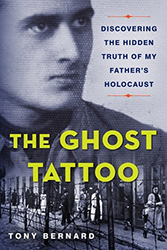Born in 1974 to a German father and a French mother, author Géraldine Schwarz has shouldered both countries’ twentieth-century history and carried it with her into the twenty-first. Her exploration of the past is the basis for Those Who Forget, a book about the damage caused by willful forgetting, and the subsequent necessity of engaging in what Schwarz terms “memory work” — facing the past and acknowledging historical responsibility. This, she argues, is how to build the future.
Schwartz began her inquiry with her own family, curious about what life had been like for them during World War II. Did they support the Nazis? Did they help Jews?
She learned that her paternal grandparents did not distinguish themselves in any way, but rather were Mitläufer, those who “followed the current,” like so many other Germans of the time. They were not heroes and they were not villains, but unremarkable people “born at the dawn of a cursed century.”
Schwarz is not the first to write about how following the current helped facilitate the Nazi genocide; in 1992, Christopher Browning published Ordinary Men, a study of a German reserve police battalion for which the abnormal became normal. Unlike Browning’s ordinary men, Schwarz’s grandfather did not directly participate in rounding up or killing Jews. But he did take advantage of Nazi laws to purchase a business from Jewish owners who were forced to sell it at a greatly reduced price. Under Nazi rule, such a forced sale was legal. When one of the original three owners survived the war and then claimed compensation, Schwarz’s grandfather was outraged. After all, he and his family had also suffered during the war, he reasoned. Schwartz notes that, by casting himself as a victim of the war, her grandfather “had surreptitiously slipped into posing as a victim of the Jews.”
Schwarz wondered how such an outlook was possible. How could her grandparents and so many others like them have ignored what was happening in their country, to their neighbors?
Her grandparents were no longer living by the time she was old enough to ask such questions, but the angst they caused her led her to pursue answers within her own family and through the study of history. Schwarz, who now lives in Berlin and is a journalist, writer, and documentary filmmaker, asked the same questions of her mother’s parents and discovered that they, too, went along with the political climate of the time.
The result of Schwarz’s explorations and her determination to find answers to her questions is a work that — as its subtitle indicates — is part memoir, part history, part warning. She has skillfully woven together “the threads of major and minor history,” to offer us lessons for today. At the same time, Schwarz does not let the Holocaust lose its uniqueness or become blunted by false equivalencies.





